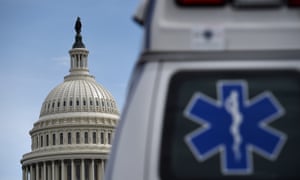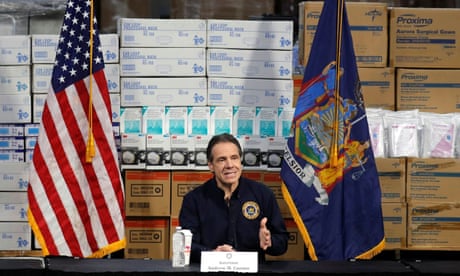TRUMP MAY NOT BE BUT THE GOVERNMENT IS...WORKING
While Washington appears to have come to a grinding halt, more than 2 million federal workers across the US continue to provide vital services
Joan E Greve THE GUARDIAN Sun 29 Mar 2020

A significant percentage of government employees are still reporting to their place of work while public health experts urge Americans to stay at home. Photograph: Olivier Douliery/AFP via Getty Images
White House tours have been canceled; Capitol Hill hallways are mostly empty; the Smithsonian museums have been closed. Washington DC, like much of the rest of the country, appears to have come to a grinding halt as America grapples with the coronavirus crisis.
But government goes on. More than 2 million federal employees spread out across America are continuing to provide vital services to keep the country running amid the crisis, often putting themselves in harm’s way to do so and dealing with previous decisions by the Trump administration that are hampering the effort.

How US governors are fighting coronavirus – and Donald Trump
The Trump administration has told federal agencies to postpone “non-mission-critical functions” to mitigate the spread of the virus, but a significant percentage of government employees are still reporting to their place of work while public health experts urge Americans to stay home.
“There are hundreds of thousands of federal workers that are still going to work today, and they have the same kind of concerns as any other worker in other sectors of the economy,” said Randy Erwin, the national president of the National Federation of Federal Employees, a union representing government workers.
Many of those government employees still reporting to their posts are unable to shift to working from home due to lack of equipment or the nature of their jobs.
For example, the Department of Defense, which reported its first coronavirus-related death on Sunday, employs many workers who retrofit critical military equipment like tanks. Hundreds of thousands of healthcare professionals working for the Department of Veterans Affairs will also need to continue caring for veterans as they contract coronavirus.
A number of those federal workers have expressed concerns about their safety, as many workplaces go without personal protective equipment to limit their risk of becoming sick. “You’d be shocked at how ill-prepared a lot of federal agencies are with even the basics,” Erwin said. He described one work site that didn’t have soap in the bathrooms, even though public health experts are recommending frequent hand-washing to mitigate the spread of the virus.
For the hundreds of thousands of federal workers who have desk jobs, the shift to telework amid the pandemic has not always been seamless. The Trump administration has tried to limit telework at multiple government agencies, after the Obama administration made efforts to expand remote working opportunities. The policy shift appears to have left the government without much of a broad strategy for how to keep federal employees working while they cannot safely go to their offices.
Some employees lack government-issued laptops, and concerns have been raised about the virtual private networks (VPNs) employees use to connect to government networks while working remotely. The Cybersecurity and Infrastructure Security Agency at the Department of Homeland Security warned in a memo earlier this month that the VPNs expose more technical “vulnerabilities”, which can be “found and targeted by malicious cyber actors”.
The agency also noted the “limited number of VPN connections” could prevent some employees from working remotely, urging senior officials to update and test VPNs to prepare for mass usage.
“I think it is obvious from the lack of equipment that our federal government was caught completely with its pants down,” Erwin said. “It’s not as easy as flipping a switch and shifting to telework.”
Moe Vela, who served as the director of administration and management to former vice-president Joe Biden, said the Trump administration had missed opportunities in the months and years leading up to the coronavirus pandemic to prepare for such a crisis.
“Our government was severely delayed in many ways in their response to the pandemic,” Vela, now chief transparency officer of TransparentBusiness, said. The former White House official noted the government “tends to operate somewhat like a dinosaur”, so federal agencies are often slow to implement beneficial changes to long-standing systems, which may have cost the Trump administration some critical time in responding to the pandemic.
“However, I do not think it’s irreparable, and it can be addressed,” Vela added. He argued the government needs to move quickly to implement a robust teleworking policy that would allow more employees to avoid public transportation and offices, limiting the spread of the virus.
As the country’s largest employer, the federal government could be setting an example on how to responsibly continue operations amid the pandemic, Erwin said. “The federal government should be a leader in these things, and telework is one of the primary ways that you can still get business done while respecting the guidance on social distancing,” the union president said.
But Donald Trump appears eager to resume normal operations, saying on Tuesday that he wants the country “opened up and just raring to go by Easter”. The comments raised concerns that federal employees who have been able to work remotely will be forced to return to their offices while the pandemic is still raging.
“If in the near term they make a shift to bring people back to work, I can promise you federal employees will be extremely concerned for their safety,” Erwin said. “And I can promise you that as the union representing them, we will fight that with every fiber of our being.”
Having served on the White House emergency preparedness council, Vela urged the president to defer to public health experts, who have warned the country may need to adhere to social distancing practices for at least several more weeks. “Please stop prescribing. Just facilitate and coordinate,” Vela said of Trump’s approach to the crisis. “That’s what the role of the federal government is, to keep our citizens safe, and you’re not keeping people safe when you don’t listen to the experts.”
White House tours have been canceled; Capitol Hill hallways are mostly empty; the Smithsonian museums have been closed. Washington DC, like much of the rest of the country, appears to have come to a grinding halt as America grapples with the coronavirus crisis.
But government goes on. More than 2 million federal employees spread out across America are continuing to provide vital services to keep the country running amid the crisis, often putting themselves in harm’s way to do so and dealing with previous decisions by the Trump administration that are hampering the effort.

How US governors are fighting coronavirus – and Donald Trump
The Trump administration has told federal agencies to postpone “non-mission-critical functions” to mitigate the spread of the virus, but a significant percentage of government employees are still reporting to their place of work while public health experts urge Americans to stay home.
“There are hundreds of thousands of federal workers that are still going to work today, and they have the same kind of concerns as any other worker in other sectors of the economy,” said Randy Erwin, the national president of the National Federation of Federal Employees, a union representing government workers.
Many of those government employees still reporting to their posts are unable to shift to working from home due to lack of equipment or the nature of their jobs.
For example, the Department of Defense, which reported its first coronavirus-related death on Sunday, employs many workers who retrofit critical military equipment like tanks. Hundreds of thousands of healthcare professionals working for the Department of Veterans Affairs will also need to continue caring for veterans as they contract coronavirus.
A number of those federal workers have expressed concerns about their safety, as many workplaces go without personal protective equipment to limit their risk of becoming sick. “You’d be shocked at how ill-prepared a lot of federal agencies are with even the basics,” Erwin said. He described one work site that didn’t have soap in the bathrooms, even though public health experts are recommending frequent hand-washing to mitigate the spread of the virus.
For the hundreds of thousands of federal workers who have desk jobs, the shift to telework amid the pandemic has not always been seamless. The Trump administration has tried to limit telework at multiple government agencies, after the Obama administration made efforts to expand remote working opportunities. The policy shift appears to have left the government without much of a broad strategy for how to keep federal employees working while they cannot safely go to their offices.
Some employees lack government-issued laptops, and concerns have been raised about the virtual private networks (VPNs) employees use to connect to government networks while working remotely. The Cybersecurity and Infrastructure Security Agency at the Department of Homeland Security warned in a memo earlier this month that the VPNs expose more technical “vulnerabilities”, which can be “found and targeted by malicious cyber actors”.
The agency also noted the “limited number of VPN connections” could prevent some employees from working remotely, urging senior officials to update and test VPNs to prepare for mass usage.
“I think it is obvious from the lack of equipment that our federal government was caught completely with its pants down,” Erwin said. “It’s not as easy as flipping a switch and shifting to telework.”
Moe Vela, who served as the director of administration and management to former vice-president Joe Biden, said the Trump administration had missed opportunities in the months and years leading up to the coronavirus pandemic to prepare for such a crisis.
“Our government was severely delayed in many ways in their response to the pandemic,” Vela, now chief transparency officer of TransparentBusiness, said. The former White House official noted the government “tends to operate somewhat like a dinosaur”, so federal agencies are often slow to implement beneficial changes to long-standing systems, which may have cost the Trump administration some critical time in responding to the pandemic.
“However, I do not think it’s irreparable, and it can be addressed,” Vela added. He argued the government needs to move quickly to implement a robust teleworking policy that would allow more employees to avoid public transportation and offices, limiting the spread of the virus.
As the country’s largest employer, the federal government could be setting an example on how to responsibly continue operations amid the pandemic, Erwin said. “The federal government should be a leader in these things, and telework is one of the primary ways that you can still get business done while respecting the guidance on social distancing,” the union president said.
But Donald Trump appears eager to resume normal operations, saying on Tuesday that he wants the country “opened up and just raring to go by Easter”. The comments raised concerns that federal employees who have been able to work remotely will be forced to return to their offices while the pandemic is still raging.
“If in the near term they make a shift to bring people back to work, I can promise you federal employees will be extremely concerned for their safety,” Erwin said. “And I can promise you that as the union representing them, we will fight that with every fiber of our being.”
Having served on the White House emergency preparedness council, Vela urged the president to defer to public health experts, who have warned the country may need to adhere to social distancing practices for at least several more weeks. “Please stop prescribing. Just facilitate and coordinate,” Vela said of Trump’s approach to the crisis. “That’s what the role of the federal government is, to keep our citizens safe, and you’re not keeping people safe when you don’t listen to the experts.”
---30---
No comments:
Post a Comment